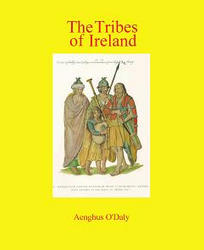
THE TRIBES OF IRELAND. The Irish enjoyed a scholarly revival of their culture during the mid 19th century. A number of scholars interested in Irish antiquities. Books and publications appeared on all sorts of topics. Books on Irish genealogies were published in numbers, as were translations of ancient Irish works. Antiquarian John O’Donovan and poet James Clarence Mangan worked together to create a translation of Anghus O’Daly’s 17th century satiric poem “The Tribes of Ireland.” The book included an unusual tribute. O’Donovan included a genealogy of the publisher John O’Daly as part of the work. The tribute indicates just how much of the work of the “Gaelic Revival” John O’Daly conducted from his bookshop. “The Tribes of Ireland” like a number of other works of translation included the original Irish language text in the original Irish language typeset. This perhaps was intended to inspire a revival of interest in the Irish language at a time when it was rapidly disappearing from the country. Clicking on the image will take you to the O’Daly Bookshop where you can learn more.
|
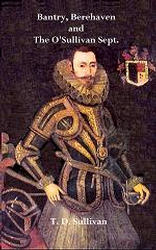
O’SULLIVAN SEPT HISTORY. Modern O’Dalys, of course, are descended from many clans, families, and septs. The O’Daly Bookshop project is making an effort to provide new editions of histories and genealogies of other Irish clans, families, and septs. These histories provide additional depth to research on a family genealogy, history, or study on Irish history. The history of Ireland comes alive in a personal way through the telling of the history of each family and sept! What a reader will also realize is that each of the Irish septs and families also has its own distinct personality and traditions. Modern O’Dalys, and descendants of other clans, septs, and families, are welcome to explore the offerings O’Daly Bookshop. Clicking on the image will take you to the O’Daly Bookshop where you can learn more.
|
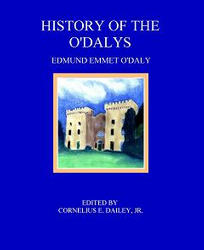
HISTORY OF THE O’DALYS. Modern O’Daly interested in their genealogy and sept traditions are not only interested in “The Tribes of Ireland,“ they are looking for Edmund Emmet O’Daly’s 1937 book “History of the O’Dalys.” O’Daly’s work explores the earliest possible origins of the O’Daly sept, looking at pre-Christian ogham stones and exploring the mythological origins of the sept, as well as the extensive historical record. New editions of these and other books on O’Daly history, Irish history, and Irish and Irish-American culture are now being made available through the O’Daly Bookshop project. Clicking on the image will take you to the O’Daly Bookshop where you can learn more.
|
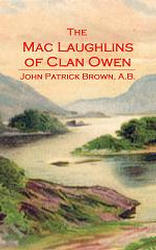
McLAUGHLIN CLAN HISTORY. The McLaughins are another family among Ireland’s Ui Niall families. John Patrick Brown’s history of the clan is available in the bookshop, as are books for other Irish families, septs, and clans. Clicking on the image will take you to the O’Daly Bookshop where you can learn more.
|
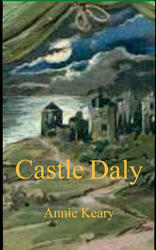
CASTLE DALY. The ancient sept of the O’Dalys has had an impact upon Irish and Irish-American culture from ancient times. In the 1870’s, English author Annie Kearny used a fictionalized version of Castledaly as a backdrop to her popular novel “Castle Daly.” The Dalys in her story provided her with an archetypal Irish family of the landed class. The Dalys of the novel were confronted by issues not only of class, but of tensions between Irish and English identity and of the Great Hunger which has not yet happened as the story opens. Kearny explores her ideas of what it means to be Irish through her work, and exploration which was read through many popular printings in the years that followed. Clicking on the image will take you to the O’Daly Bookshop where you can learn more.
|

A CHRISTMAS DREAM. Another objective of the shop is to provide books which explore the development of a uniquely Irish-American culture. The Irish in America tried to recreate their homeland in the United States. What they created was something both Irish and American! A number of Irish-American authors are represented in the bookshop. Some may even surprise modern readers, and family genealogists. The Irish who immigrated into the United States worked hard to build their own uniquely Irish society. From early in their arrival, they filled a wide range of professions; law, medicine, publishing, commerce, mining, farming, and more. They built homes, churches, and hospitals. They also provided a wide range of support for new Irish immigrants and others who were struggling to survive in their new home. Brady‘s “A Christmas Dream“ may surprise readers in how it anticipates the more famous Christmas story which Charles Dickens later wrote. The books offered in the O’Daly Bookshop are generally not available from other sources. Preserving and celebrating Irish history and genealogy has been a tradition of the O’Dalys from ancient times. The O’Daly Bookshop has shipped books around the globe! The bookshop project offers a number of ways for people to explore the evolution of both the modern Irish and the modern Irish-American identities. Clicking on the image will take you to the O’Daly Bookshop where you can learn more.
|





